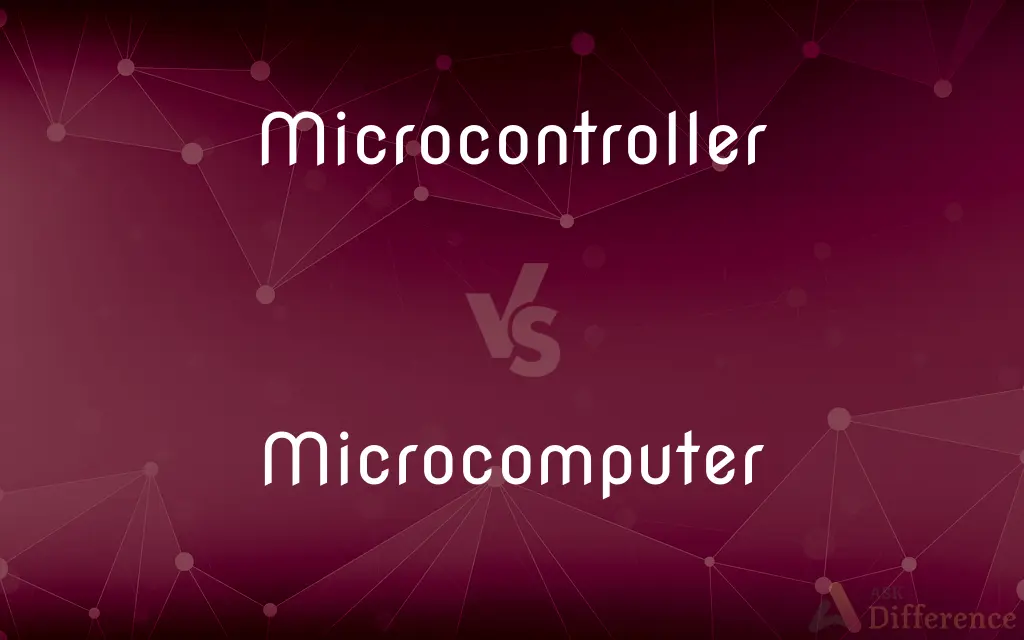Microcontroller vs. Microcomputer — What's the Difference?
By Urooj Arif & Maham Liaqat — Updated on March 9, 2024
Microcontrollers are integrated circuits designed for specific control tasks, featuring built-in memory and peripherals, while microcomputers are compact, versatile computing systems with separate components for processing, memory, and I/O functions.

Difference Between Microcontroller and Microcomputer
Table of Contents
ADVERTISEMENT
Key Differences
Microcontrollers (MCUs) are single-chip solutions primarily used in embedded systems for specific control-oriented tasks. They integrate a processor, memory, and input/output peripherals on a single chip. On the other hand, microcomputers are more comprehensive computing devices that can perform a wide range of computing tasks. They typically consist of a CPU, separate memory modules (RAM, ROM), and input/output interfaces, all connected via a bus.
While microcontrollers are designed with a focus on minimizing size and cost, optimizing them for dedicated control applications, microcomputers provide a more general computing platform. This makes microcomputers suitable for a broader range of applications, from personal computing to complex industrial processes.
The programming and operational complexity of microcontrollers is usually lower than that of microcomputers, due to their specific and limited applications. Microcomputers, with their versatile architecture, support a wide variety of programming languages and operating systems, facilitating complex software applications and multitasking.
In terms of power consumption, microcontrollers are typically more efficient due to their simplicity and specific functionalities. Microcomputers, offering greater performance and versatility, generally consume more power, reflecting their broader capabilities and higher processing power.
Microcontrollers are often embedded within devices and operate as part of a larger system, rarely requiring direct user interaction. Microcomputers, in contrast, are usually designed for direct interaction and can run a wide range of software applications, from word processors to games, making them more interactive and user-friendly.
ADVERTISEMENT
Comparison Chart
Definition
An integrated circuit designed for specific control tasks with built-in memory and peripherals.
A compact computing system with separate components for processing, memory, and I/O.
Usage
Embedded in devices for dedicated control applications.
Used for a broad range of computing tasks.
Components
Integrates processor, memory, and I/O peripherals on a single chip.
Consists of CPU, separate memory modules, and I/O interfaces.
Programming
Lower complexity, specific applications.
Supports a wide variety of languages and operating systems.
Power Consumption
Typically more efficient due to specific functionalities.
Generally higher due to greater performance and capabilities.
Compare with Definitions
Microcontroller
Low Power.
Microcontrollers are favored in battery-operated devices for their low power consumption.
Microcomputer
Higher Power Use.
The advanced capabilities of microcomputers lead to higher power consumption.
Microcontroller
Embedded Control.
The microcontroller in the washing machine controls the wash cycles.
Microcomputer
Interactive Applications.
Microcomputers are used in interactive applications, from gaming to data analysis.
Microcontroller
Single-Chip Solution.
A microcontroller integrates all necessary components on one chip, simplifying design.
Microcomputer
User-Friendly.
Microcomputers offer a user-friendly interface for a wide range of tasks and applications.
Microcontroller
Specific Tasks.
A microcontroller is programmed to perform specific tasks, like monitoring temperature.
Microcomputer
Component Flexibility.
Microcomputers allow for upgrades and changes to memory or processors.
Microcontroller
Cost-Efficient.
Their integration and simplicity make microcontrollers cost-effective for mass production.
Microcomputer
Versatile Computing.
Microcomputers serve as personal computers, capable of running various applications.
Microcontroller
A microcomputer on a single chip, used to control some device such as an automobile engine or a toy.
Microcomputer
A microcomputer is a small, relatively inexpensive computer with a microprocessor as its central processing unit (CPU). It includes a microprocessor, memory and minimal input/output (I/O) circuitry mounted on a single printed circuit board (PCB).
Microcontroller
A microcontroller (MCU for microcontroller unit) is a small computer on a single metal-oxide-semiconductor (MOS) integrated circuit (IC) chip. A microcontroller contains one or more CPUs (processor cores) along with memory and programmable input/output peripherals.
Microcomputer
A personal computer.
Microcomputer
(computer hardware) A computer designed around a microprocessor, smaller than a minicomputer or a mainframe.
Microcomputer
A small computer based on a microprocessor; in practise, at any given time in the technology of computer development, a microcomputer will be one that is less powerful than a minicomputer.
Microcomputer
A small digital computer based on a microprocessor and designed to be used by one person at a time
Common Curiosities
What is a microcontroller?
A microcontroller is an integrated circuit designed for controlling a specific task within an electronic device.
What distinguishes a microcomputer?
A microcomputer is a compact, versatile computing system capable of performing a wide range of tasks, equipped with separate components for processing, memory, and input/output functions.
Can microcontrollers run complex software like microcomputers?
Microcontrollers are generally programmed for specific tasks and lack the complexity to run multifaceted software applications typical of microcomputers.
What are typical applications of microcontrollers?
Microcontrollers are used in appliances, vehicles, and medical devices for control and monitoring functions.
Is it easier to program a microcontroller or a microcomputer?
This depends on the application; microcontrollers are simpler for dedicated tasks, while microcomputers offer more flexibility for complex applications.
What kind of operating systems do microcontrollers and microcomputers use?
Microcontrollers often use real-time operating systems (RTOS) designed for specific control tasks, whereas microcomputers can run a wide range of operating systems, including Windows, Linux, and macOS.
Why are microcontrollers considered more power-efficient?
Their design for specific tasks and integrated components minimize power consumption, unlike the broader capabilities of microcomputers which require more power.
Are microcontrollers cheaper than microcomputers?
Generally, yes, because microcontrollers are designed for mass production with specific functionalities, making them less expensive than the more versatile microcomputers.
How do microcomputers differ from traditional computers?
Microcomputers are essentially compact versions of traditional computers, designed for personal or small-scale use, with the same basic architecture but at a smaller scale.
Can a microcomputer function as a microcontroller?
Theoretically, yes, but it would be inefficient and costly for tasks that a microcontroller can accomplish due to the microcomputer's complexity and power consumption.
Are microcomputers and microcontrollers interchangeable?
No, their applications differ significantly; microcontrollers are for specific control tasks, while microcomputers are versatile computing platforms.
Can microcomputers be used in embedded systems like microcontrollers?
While possible, microcomputers are generally too complex and power-hungry for applications where microcontrollers are preferred.
How do upgrades differ between microcontrollers and microcomputers?
Upgrading a microcontroller typically involves reprogramming or replacing the chip, whereas microcomputers can be upgraded by adding or replacing components.
How has the use of microcontrollers and microcomputers evolved?
Both have seen significant evolution, with microcontrollers becoming more powerful and integrated, while microcomputers have become more compact, efficient, and capable, expanding their application range.
What skills are needed to work with microcontrollers?
Working with microcontrollers requires knowledge of electronics, programming (often in C or assembly language), and an understanding of the device’s specific control tasks.
Share Your Discovery

Previous Comparison
Presume vs. Resume
Next Comparison
Pawned vs. PwnedAuthor Spotlight
Written by
Urooj ArifUrooj is a skilled content writer at Ask Difference, known for her exceptional ability to simplify complex topics into engaging and informative content. With a passion for research and a flair for clear, concise writing, she consistently delivers articles that resonate with our diverse audience.
Co-written by
Maham Liaqat














































